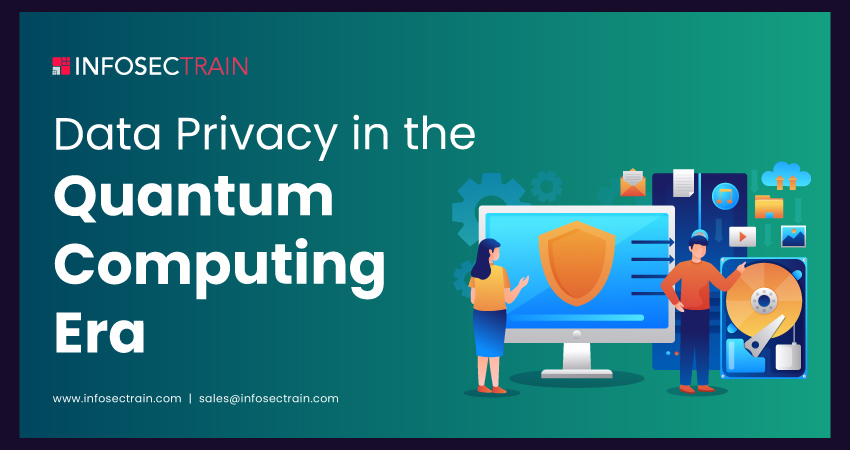Data Privacy in the Quantum Computing Era
In the ever-changing tech landscape, quantum computing emerges as a promise of formerly unknown power and a threat to data security through encryption. The enormous computational strength of quantum computers challenges once-deemed invincible traditional methods. As we approach the quantum era, data privacy is in danger, and we face real challenges from quantum computers. Yet, ongoing innovations in post-quantum cryptography showcase human adaptability in countering technological advances. Embracing quantum-resistant cryptographic techniques strengthens our defenses, ensuring confidential and secure data in uncharted quantum territories. This article explores the hurdles quantum computing poses to data privacy and the inventive solutions shaping secure information exchange.

What is Data Privacy in a Quantum Computing Era?
In the era of quantum computing, data privacy involves actively defending information from potential unauthorized access, use, or disclosure due to the computational capabilities of quantum computers. Quantum technology threatens traditional encryption methods that were once considered secure. Safeguarding data in this evolving landscape requires constant innovation and adaptation. As we approach the quantum era, the security of sensitive information faces unprecedented challenges. Ongoing efforts in quantum-resistant cryptographic techniques demonstrate our commitment to preserving data confidentiality. Embracing these innovations ensures robust defenses in the face of quantum computing advancements.
Safeguarding Data Privacy in the Quantum Computing Era: Key Strategies for Organizations
1. Integrating Quantum-Resistant Cryptography (PQC):
Organizations should proactively adopt PQC, an advanced cryptographic method impervious to quantum computers. Immediate planning for the transition to PQC algorithms is crucial to enhance data security in the quantum computing era. This involves preparing for a seamless migration to ensure robust protection against emerging quantum threats.
2. Harnessing Quantum Key Distribution (QKD):
QKD utilizes quantum mechanics to securely distribute encryption keys, offering a robust method for safeguarding data in transit and at rest. This innovative approach enhances security by leveraging the principles of quantum physics to ensure the confidentiality of encryption keys.
3. Vigilance Against Quantum Threats:
Organizations must actively monitor and swiftly respond to emerging quantum threats. This entails vigilant monitoring for potential vulnerabilities in encryption algorithms and the presence of malware specifically designed to target quantum computers. Being proactive in threat detection and response is crucial in safeguarding against evolving risks in the quantum computing landscape.
4. Crafting Quantum-Resistant Security Protocols:
Organizations must innovate and create security protocols resilient to quantum attacks, covering authentication, authorization, and data encryption. This proactive approach involves developing protocols that can withstand the unique challenges posed by quantum computing, ensuring robust protection across various security aspects.
5. Implementing Data Encryption Management (DEM) Solutions:
Leveraging a DEM solution aids organizations in efficiently managing and safeguarding encryption keys. This becomes crucial in ensuring continuous data encryption, even in the face of potential threats from quantum computers attempting to compromise encryption algorithms.
6. Empowering Employees on Quantum Computing and Data Privacy:
Organizations should provide training to educate employees about the risks associated with quantum computing and impart knowledge on safeguarding data from potential quantum attacks. This proactive measure ensures that employees are well-informed and equipped to contribute to protecting sensitive information in the quantum era.
7. Enforcing a Zero-Trust Security Model:
Before accessing any resource, every user and device must confirm their identities when implementing a zero-trust security model. This approach significantly enhances data protection, ensuring security against unauthorized access, even when a quantum computer attempts to compromise encryption.
How can InfosecTrain Help?
Considering the advent of quantum computing, the importance of quantum-safe cybersecurity cannot be emphasized enough. Quantum computers will eventually threaten the fundamentals of the current encryption techniques. Companies need to keep ahead of this quantum revolution by being proactive. The quantum threat is one aspect of the changing cybersecurity landscape that InfosecTrain understands. We provide professionals with the tools and training they need to adjust to new problems because we are dedicated to setting the standard in cybersecurity education. By working together, we can strengthen the digital future in the quantum computing era. Remain vigilant and educated!







 1800-843-7890 (India)
1800-843-7890 (India)